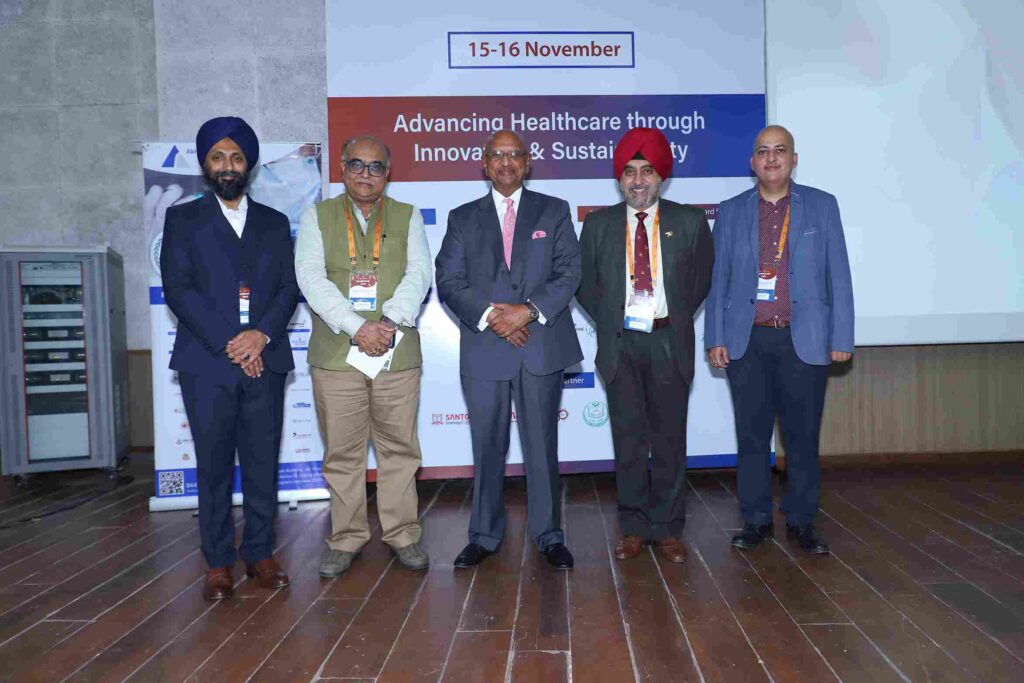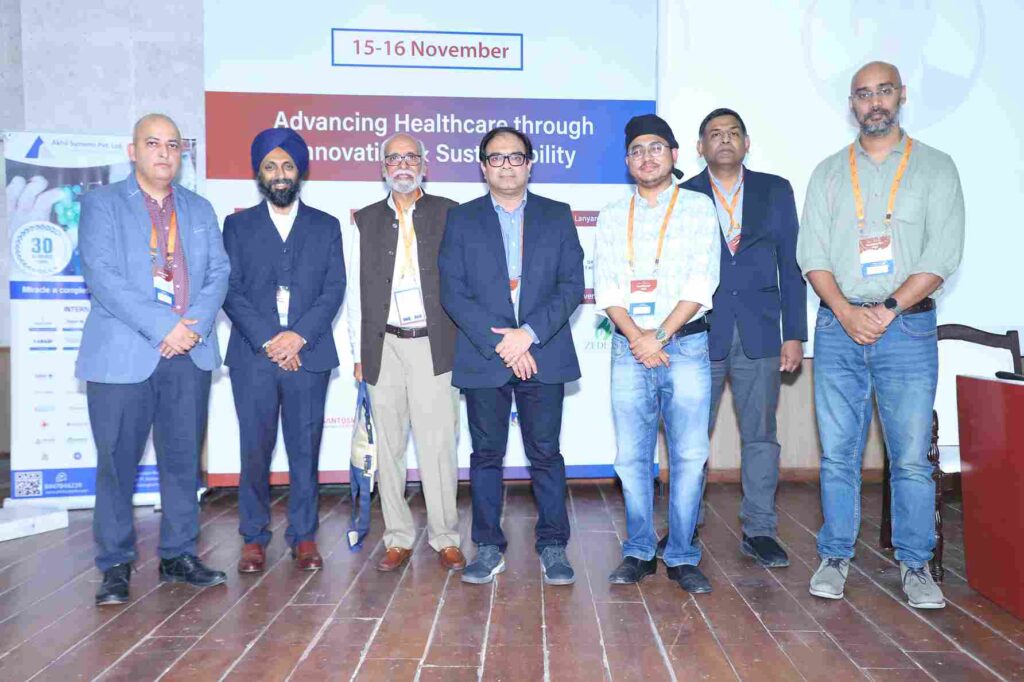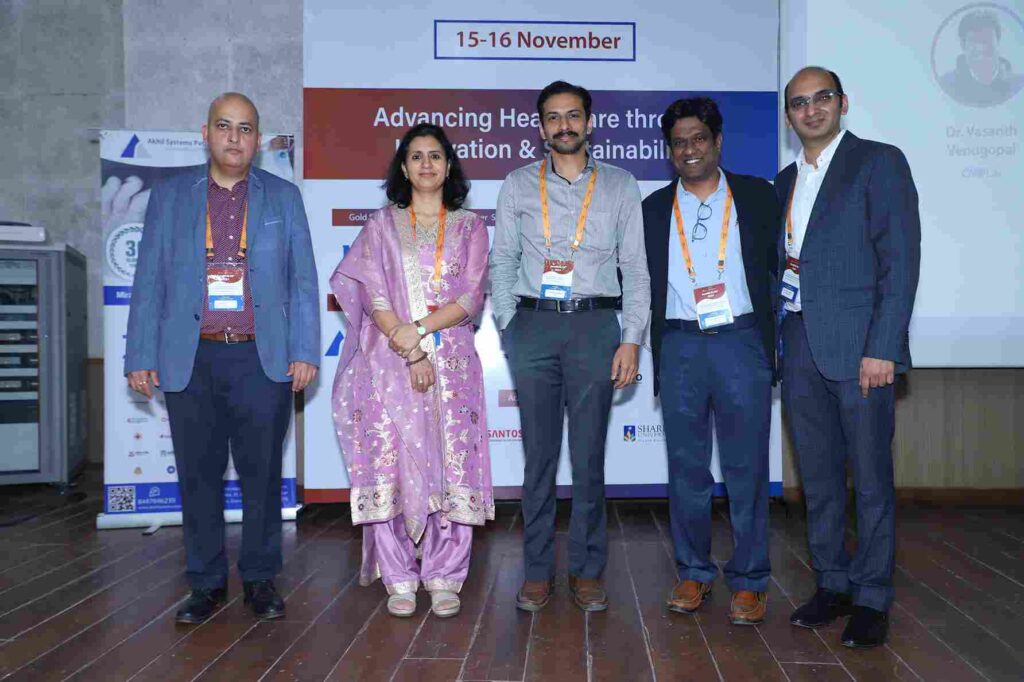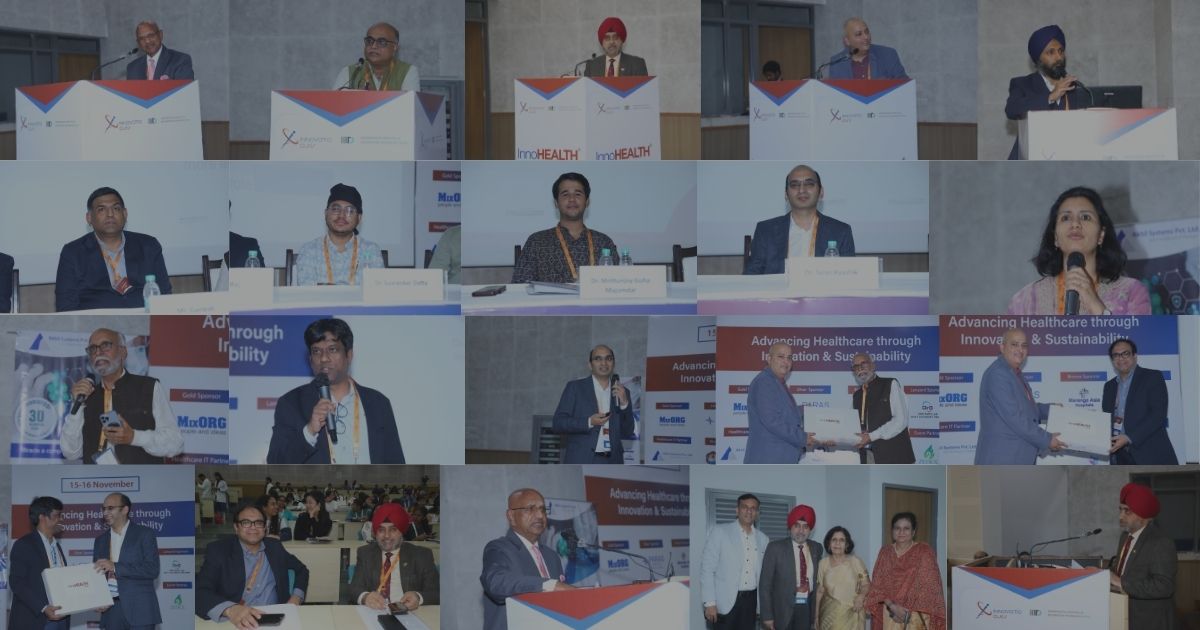
DAY – 1
Session- 1: Inaugural Session
The 7th edition of the InnoHEALTH Conference at IIIT Delhi brought together a diverse group of healthcare professionals, innovators, and visionaries. This year’s event was marked by powerful speeches, groundbreaking ideas, and heartfelt tributes to the late Surgeon Rear Admiral Dr. V.K. Singh, a pioneer in healthcare innovation.
The session began with a warm welcome from the master of ceremony, Ms. Tuba khan and Ms. Mariam Khan, who emphasized that innovation is the driving force behind improving healthcare outcomes. They introduced InnoHEALTH, a premier platform created by InnovatioCuris in partnership with IIIT Delhi, that fosters collaboration among global thought leaders and practitioners.

Key Highlights from the Esteemed Speakers
Dr. Tavpritesh Sethi
As the host representative from IIIT Delhi, Dr. Tavpritesh Sethi welcomed attendees, emphasizing the institute’s commitment to harnessing AI and digital technologies to transform healthcare and address global challenges like climate change. He reflected on Dr. Singh’s role in shaping the conference and commended the growing engagement of innovators in tackling real-world problems.
Major General Dr.Jagtar Singh
In a moving tribute to the late Dr. V.K. Singh, Major General Dr. Jagtar Singh recounted his unparalleled contributions to the Armed Forces Medical Services and civilian healthcare systems. He shared anecdotes about Dr. Singh’s visionary leadership, including his pioneering efforts in combat medical care, ambulance systems, and field hospital innovations. His speech was a heartfelt reminder of Dr. Singh’s humility, dedication, and unwavering commitment to innovation.
Dr. Shirshendu Mukherjee
Dr. Shirshendu Mukherjee, MD of Wadhwani Innovation Network, spoke about his collaborative journey with Dr. V.K. Singh, starting in 2010. He highlighted Dr. Singh’s foresight in nurturing India’s innovation ecosystem and recalled their joint initiatives, including grant-writing workshops for young innovators. Dr. Mukherjee described Dr. Singh as an exceptional mentor who valued teamwork and consistently empowered those around him to excel.
(Hony.) Brig.Dr. Arvind Lal
Honorary Brigadier Dr. Arvind Lal, Chairman of Dr. Lal Path Labs, reflected on the role of innovation in healthcare transformation. He lauded Dr. Singh’s leadership in managing crises and establishing healthcare systems during emergencies. Dr. Lal also emphasized the importance of regulation, collaboration, and investment in fostering a robust healthcare innovation ecosystem, projecting a bright future for India as a global leader in healthcare solutions.
Sachin Gaur
Director of Operations at InnovatioCuris, Sachin Gaur, expressed his gratitude to the speakers and attendees. He shared personal reflections on working with Dr. Singh, describing him as a mentor who championed innovation and inspired people from all walks of life. Sachin highlighted the importance of creating platforms for young innovators and urged participants to carry forward Dr. Singh’s legacy by fostering inclusive and impactful innovations.
Legacy of Dr. V.K. Singh
Throughout the conference, speakers reiterated Dr. Singh’s contributions, from his groundbreaking studies in ambulance systems to his global impact on healthcare management and innovation. His legacy, embodied in the InnoHEALTH platform, continues to inspire the next generation of healthcare leaders.
The InnoHEALTH Conference 2024 served as a testament to the transformative power of innovation and collaboration. The insights and experiences shared by the speakers not only honored Dr. Singh’s memory but also charted a course for a future where healthcare innovation thrives in making a global impact.
Session- 2: Navigating the AI Frontier
(Transforming Healthcare with Large Language Models)
The InnoHEALTH Conference 2024 witnessed a groundbreaking session titled “Navigating the AI Frontier: Transforming healthcare with Large Language Models,” bringing together experts from various domains to explore the transformative potential of artificial intelligence (AI) in modern healthcare. Held at IIIT Delhi, the session delved into the opportunities, challenges, and future of Large Language Models (LLMs) in medical applications.

Setting the Stage for Innovation
The session began with an engaging introduction by the moderator, Mr. Sachin Gaur, Director of Operations at InnovatioCuris, who emphasized the paradigm shift AI is bringing to healthcare. He highlighted how LLMs have transitioned from futuristic concepts to indispensable tools, streamlining workflows and offering personalized healthcare solutions.
Interactive Demo: AI in Action
The session featured a live demo showcasing the capabilities of AI-powered virtual assistants. Attendees witnessed an AI medical assistant named “John” conducting a simulated patient interaction. The AI assistant demonstrated its ability to gather symptom details, generate structured reports, and provide preliminary assessments—all in real time.
This interactive demonstration underscored the practicality of AI in enhancing efficiency and accuracy in patient care. The audience was impressed by how such tools could transform mundane tasks, allowing healthcare professionals to focus on critical decision-making.
Expert Insights and Discussions
- Mr. Ganesh Gopalan, Co-founder and CEO of Gyani AI:
With over 25 years of experience in technology and marketing, Mr. Gopalan showcased the practical applications of AI in healthcare. He highlighted how LLMs enhance patient care through real-time insights and scalable solutions, revolutionizing traditional medical practices. - Dr. Tavpratesh Sethi, Associate Professor of Computational Biology, IIIT Delhi:
Dr. Sethi explored the use of LLMs in analyzing complex medical data, such as ICU monitoring and patient trajectory predictions. He stressed the need for interoperability and standardized frameworks to optimize AI’s integration into healthcare systems. - Kshitij Jadhav, Assistant Professor at Koita Center for Digital Health, IIT Bombay:
Dr. Jada focused on how AI-powered tools can improve community health by providing scalable, customized solutions. He highlighted case studies where LLMs have been deployed successfully in resource-constrained settings to deliver timely medical advice. - Dr. Suvrankar Datta, Senior Resident, AIIMS Delhi:
Dr. Datta shared his journey transitioning from clinical practice to AI research. He emphasized the potential of open-source AI tools in democratizing healthcare technology and enabling cost-effective solutions for Indian medical setups. - Dr. Amit Raj, Medical Director, Plexus Medcare:
As a cardiologist with over a decade of experience, Dr. Raj underscored the importance of AI in generating precise and actionable medical reports. He advocated for the use of LLMs in simplifying complex medical terminologies for better patient comprehension. - Dr. Vijay Agrawal, President, Consortium of Accredited Healthcare Organizations (CAHO):
Dr. Agrawal addressed the critical need for problem-centric AI solutions in healthcare. He proposed creating a directory of validated healthcare apps and tools to foster trust and ensure large-scale adoption of AI technologies.
A Glimpse Into the Future
The panelists collectively envisioned the evolution of AI in healthcare, identifying promising areas such as:
- Real-time patient monitoring: Continuous vital sign tracking to predict and prevent emergencies.
- Interoperable frameworks: Developing standardized systems to enhance data sharing and AI training.
- Open-source collaboration: Leveraging open-access tools to bridge resource gaps in global healthcare.
- Customizable AI models: Tailoring LLMs to specific clinical settings for optimized performance.
Celebrating Contributions
The session concluded with felicitation ceremonies for the speakers, acknowledging their invaluable contributions to the conference. Attendees left inspired, with actionable insights to leverage AI in reshaping healthcare delivery.
The InnoHEALTH Conference 2024 exemplified how technology and innovation can converge to address complex healthcare challenges. By fostering dialogue among industry leaders, the event underscored the immense potential of AI to transform healthcare into a more accessible, efficient, and patient-centric system.
https://youtu.be/KRPMtqyJO2s?si=fcLtLhGfYBL43acR
Session- 3: The shift in healthcare AI
(From CNNs to Foundation Models, Vision-Language Models, and LLMs)
The InnoHEALTH 2024 conference, Session 3, titled “A Shift in Healthcare AI: From CNNs to Foundation Models, Vision-Language Models, and LLMs“, brought together a panel of experts who delved into how these technologies are reshaping diagnostics, predictive analytics, and patient care.

Highlights from the Panelists
Dr. Vasanth Venugopal (Moderator)
Dr. Vasanth opened the session by highlighting AI’s rapid evolution from a concept to a practical tool in healthcare. He emphasized the role of large language models (LLMs) and vision-based AI in improving diagnostic accuracy and efficiency. He underscored the need for interdisciplinary collaboration to integrate these tools effectively into healthcare systems.
Dr. Devasenathipathy Kandasamy
Dr. Kandasamy discussed the transformative impact of AI in clinical research. He explained how machine learning algorithms streamline clinical trials by automating data analysis and patient recruitment. This has significantly reduced time and costs associated with research. He also stressed the ethical considerations of using AI in clinical settings, advocating for transparency and robust data governance.
Dr. Tarun Kaushik
Drawing from his experience in nephrology, Dr. Kaushik focused on AI’s application in managing kidney diseases. He highlighted AI-powered dialysis machines that monitor patient vitals and blood parameters in real time. These systems can optimize treatment plans and predict complications, improving patient outcomes. Dr. He also addressed the cost challenges of implementing AI technologies in resource-constrained environments but expressed optimism about their future accessibility.
Dr. Mrittunjoy Guha Majumdar
Dr. Majumdar introduced the concept of Quantum Machine Learning (QML), a cutting-edge approach combining quantum computing and AI. He explained how QML leverages quantum properties like superposition and entanglement to process complex datasets more efficiently. Dr. Majumdar illustrated its potential in genomics, drug discovery, and personalized medicine, while acknowledging the challenges of high computational costs and limited quantum infrastructure in India. He predicted that QML’s widespread adoption is 3-5 years away, with research advancing rapidly.
Dr. Arti Pawaria
Dr. Pawaria brought insights into AI’s impact on pediatric and transplantation care. She shared how AI is being used in donor-recipient matching, optimizing surgical planning, and post-operative monitoring for pediatric liver transplants. AI also plays a critical role in managing rare and complex pediatric conditions, where conventional data is often inadequate. She emphasized the need for ethical safeguards to ensure responsible use of AI, particularly for vulnerable populations like children.
AI’s Expanding Role in Healthcare
The panel collectively highlighted AI’s ability to revolutionize healthcare by improving diagnostic precision, enhancing patient care, and enabling predictive analytics. Examples included:
- AI-assisted radiology for early detection of cancers and other diseases.
- Predictive models to monitor chronic conditions, such as kidney and liver diseases.
- Personalized medicine solutions for pediatric care and complex surgeries.
Challenges and Ethical Considerations
The panelists acknowledged that while AI and QML hold immense promise, they also bring challenges:
- Data Privacy: Safeguarding patient information is crucial as AI systems process sensitive data.
- Cost of Technology: High implementation costs limit accessibility, particularly in developing countries.
- Regulatory Frameworks: Evolving legal and ethical standards are necessary to govern the use of these emerging technologies.
The panel stressed the importance of creating robust frameworks to ensure that AI and QML are used responsibly and equitably.
The Future of AI and QML in Healthcare
The session concluded with a forward-looking vision of AI and QML as tools that augment human expertise rather than replace it. Collaboration between healthcare professionals, technologists, and policymakers will be essential to unlocking the full potential of these technologies.
InnoHEALTH 2024 reaffirmed its role as a platform for innovation and collaboration, showcasing how advanced technologies can lead to more efficient, equitable, and innovative healthcare systems.
Composed by:
InnoHEALTH Magazine Digital Team

